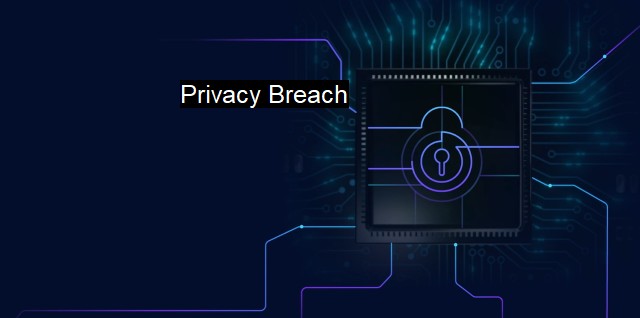What is Privacy Breach?
The Importance of Cybersecurity Measures in Preventing Privacy Breaches: Protecting Sensitive Data Against Cybercriminals and Hackers
A privacy breach, or sometimes referred to as data breach, is a serious cyber security incident that occurs when unauthorized individuals deliberately obtain and disseminate sensitive, protected or confidential data without the permission of the data owners. This can encompass information like passwords, credit card details, Social Security numbers, healthcare records, personal addresses, emails, or any other form of personal identification details.It often signals some form of weakness or loophole within a system's security. Breaches can occur in a multitude of ways ranging from simple human error, such as leaving a logged-in device unattended, to intricate, malicious hacking operations. Cybercriminals are tirelessly searching digital networks for vulnerabilities to exploit and access valuable private information.
The potential motivations behind such breaches equally vary. It's common to see these unauthorized operations aim at direct financial gain through scam or sale of sensitive data to other criminals. Corporate espionage also presents itself as a motivation, using breaches to steal intellectual property or competitive information.
Ready-made tools, hacking kits, and black market trading allow even individuals with limited technical abilities to initiate breaches which add to the increasingly complex hazard of privacy breaches. ransomware, which demands financial reimbursement in exchange for not publishing sensitive data or to regain access, is a prevalent trend in data breaches. This addresses to the growth of privacy breaches as a major economic criminal enterprise, not just a spontaneous act of individual hackers.
The scale of a privacy breach can be vast or restricted, influencing a few people or millions. Beyond the financial and commercial losses that organizations encounter after a privacy breach, the violation often leads to serious fallout in consumer and investor trust which may be long-lasting.
An effective antivirus softwares has become an essential tool in preventing privacy breaches. It serves as a fundamental line of defense against various forms of digital threats by scanning, detecting, and excluding malware. Besides destructive viruses that can lead to data destruction, antivirus can detect stealthy Spyware that quietly steals information, and Trojans, which present as legitimate software to gain accessibility.
Alongside antivirus software, there are certain practices vital to a web user to reduce the likelihood of a privacy breach. Securing proper firewalls, using complex and unique passwords, encrypting sensitive data, avoiding risky web behavior such as clicking on suspicious links, and frequently updating software to include the latest security patches, are essential preventive measures.
While technological defenses significantly assist in minimizing privacy breaches, cybersecurity strategies must still consider the human factor. Employees at all levels must be educated about the criticality of abiding by the security policies and practices to minimize the risks of breach due to human negligence or error.
Privacy breaches have catastrophic ripple effects that go beyond mere financial implications. They impair corporate reputations, compromise national security when government data is at stake, and disrupt countless lives by allowing cybercriminals to commit identity fraud. As our reliance on digital networks and platforms continues to increase, the realm of cybersecurity and antivirus security needs to constantly evolve in response to the relentlessly advancing threats of privacy breaches.
In sum, privacy breaches pose a severe threat to individual, business, and governmental cybersecurity. By diligently employing antivirus systems, instituting proactive measures and remaining vigilant about their online behavior, users can form a formidable defense against these harmful attacks. It's an imperative that shared responsibility must be taken from all stakeholders, starting from government agencies to tech companies and ultimately to end-users, to work in unison to strengthen cybersecurity measures globally.

Privacy Breach FAQs
What is a privacy breach?
A privacy breach refers to the unauthorized access or exposure of personal or confidential information. It can occur when cybersecurity measures fail or when an individual or organization intentionally or unintentionally accesses or discloses sensitive information.What are the consequences of a privacy breach?
The consequences of a privacy breach can be severe and far-reaching, including financial loss, damage to the reputation of the affected individual or organization, legal liability, and other indirect costs such as loss of trust and decreased productivity.How can I protect myself and my organization from privacy breaches?
To protect yourself and your organization from privacy breaches, you should implement cybersecurity measures such as firewalls, antivirus software, and data encryption. It is also essential to regularly educate your staff on the importance of data privacy and how to identify and report potential privacy breaches.What should I do if I suspect a privacy breach has occurred?
If you suspect a privacy breach has occurred, you should immediately take steps to limit the damage, including changing passwords, notifying affected parties, and reporting the incident to authorities. You may also need to investigate the cause of the breach, implement new security measures to prevent future breaches, and seek legal advice if necessary.| | A | | | B | | | C | | | D | | | E | | | F | | | G | | | H | | | I | | | J | | | K | | | L | | | M | |
| | N | | | O | | | P | | | Q | | | R | | | S | | | T | | | U | | | V | | | W | | | X | | | Y | | | Z | |
| | 1 | | | 2 | | | 3 | | | 4 | | | 7 | | | 8 | | |||||||